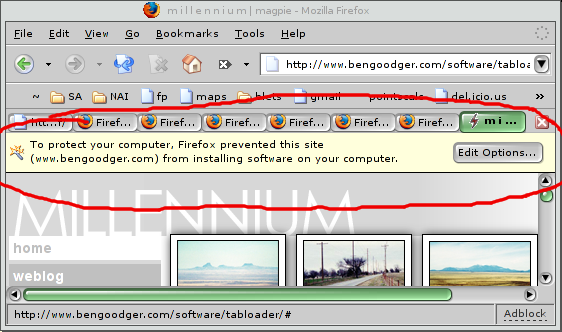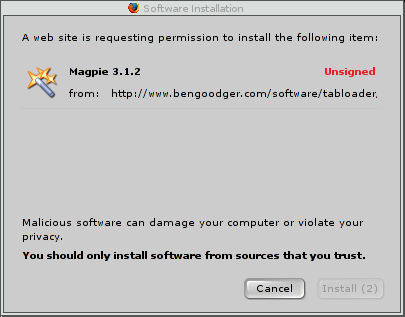Patents: here's an interesting technique I heard recently. (credit: I'm not sure who told me about it, but I think it may have come from or via John Levine.)
If you become aware of a patent application (note: not an issued patent!)
for which you are aware of possible prior art, you may be able to help
invalidate it, or at least ensure any resulting patent is narrow enough
to be relatively sane. Here's how.
- If you have knowledge of techniques that you believe may be prior art,
you can send them on to the filers or the patent examiner. At this
stage, the onus is on them to prove that the technique is not prior
art for the application (once it's granted, the onus would be on you to
prove that it is).
- The filer also must indicate techniques that they are aware of, that
may be prior art, during filing; so CC'ing a public forum with a copy
of whatever you send to them, may at some point in the future help
indicate that they did not do this.
Of course, you have to go find the patent application number, the contact
addresses of the filers, and the contact address for the patent examiner
to do this ;) But it beats posting a whinge to Slashdot.
An unnamed patent agent comments:
'I believe an examiner is not under obligation to review art sent directly
to them, but certainly the applicant and his agents are required to report
any art they come across. That means the inventor as well as the law firm
representing them.
You should include a cover letter that you saw their application
(give details), and that you believe that what you are sending them is
prior art, and that now that they have it, they are obligated to report it
to the PTO. The same can be done to their counsel.
Probably, anything sent should be sent with some sort of delivery
confirmation, and to make sure that the sending of the prior art is of
public record, create a Web site where all sent art is listed, along with
destination and confirmation information. This would help show inequitable
conduct should the patent later be asserted and the art you provided not
be shown as of record in the examination.
Mind you - I have not heard of these being done before (bombarding listed
inventors and their agents with prior art, forcing them to have to
disclose it), but I think it's a great idea. One caution - if you send too
much, you over inundate the examiner, and then really good art could get
overlooked during examination.
Separately, please keep in mind that the claims in a published application
have probably not yet even been seen by the examiner at the PTO. These are
the claims that the applicant would love to have the examiner accept, but
until prosecution of the application actually commences (and completes),
there's no way to know what claims will ultimately result.'
Update: some good additional points:
'The prior art must have been published or been publicly available at least as early as the earliest priority date of the patent. The priority date is either the filing date, or the filing date of a parent application. This information can be found on the cover page of a patent.
A patent's scope is covered by the claims. The claims define what the invention is. All other material in the patent is supporting material, and usually non-binding. In order to be anticipatory (the best kind) prior art for a particular claim, the piece of art must contain or described every element of the claim you are seeking to invalidate. Note that dependent claims add additional elements that the prior art needs to contain if you want to invalidate the dependent claims as well.
Prior art which is not anticipatory may be used in combination with other art or knowledge at the time to show obviousness. This type of art may have some impact during prosecution of a patent, but if a patent has already been issued, obviousness is a real uphill battle to fight in the courts. Few patents have been invalidated because of obviousness in trials.'
Another attorney notes: 'You can actually send it anonymously if you want. Just keep the
certified receipt to prove they got it. As long as they know it
exists, the onus is on them to disclose it to the PTO.'
'It's best to send them something printed out or on tangible media,
along with a brief note explaining what it is and most importantly,
when it was first publicly available. Certified means using certified
mail or FedEx or something where you have a valid receipt.
As far as (discovering) who the (filer's patent lawyers) are ... it's
usually listed on the patent applications. you can search the USPTO
website for them.'
And a report that this technique is now in use: 'some patent attorneys are reporting that this approach is a valid one that people have started using.'
Update 2: More assent from another unnamed patent lawyer:
'Anyone who wishes to do so can send a letter to the Patent Office letting
them know of any prior art of which they are aware. The Patent Office
will then place it in the application file. Anyone who cares about this patent
will surely order up a copy of the application file from the Patent
Office, and will come into possession of whatever you sent.
Later you can see whatever you sent them. Go to
http://portal.uspto.gov/external/portal/pair and plug in the serial number
(for the desired patent). Click on "image file wrapper".'
It's the right thing to do for any patent or patent application.'
 This is the first time I've taken the
step of quitting with any seriousness. I've been smoking since I was 18
or 19, without any real attempts to quit before now. It was a gradual
process, but imagining a smoker's future, with the diseases and reduced
life expectancy it involves, makes it quite sensible in the end. So far,
it's going pretty well -- lots of occasional pangs, but nothing I can't
say no to... especially with the aid of Liquorice Altoids. wish me luck!
This is the first time I've taken the
step of quitting with any seriousness. I've been smoking since I was 18
or 19, without any real attempts to quit before now. It was a gradual
process, but imagining a smoker's future, with the diseases and reduced
life expectancy it involves, makes it quite sensible in the end. So far,
it's going pretty well -- lots of occasional pangs, but nothing I can't
say no to... especially with the aid of Liquorice Altoids. wish me luck!

 The Stag's Head is one of Dublin's
most famous and finest landmark licensed premises, with many outstanding
Victorian features.
The Stag's Head is one of Dublin's
most famous and finest landmark licensed premises, with many outstanding
Victorian features.

 It's a great book -- full of behind-the-scenes
details on how the spammers operate, how they get away with it on the
sending end, how they try to evade filters on the receiving end, and how
they're fundamentally running the usual simple scams that have been around
since before email spam came into existence. Well worth reading.
It's a great book -- full of behind-the-scenes
details on how the spammers operate, how they get away with it on the
sending end, how they try to evade filters on the receiving end, and how
they're fundamentally running the usual simple scams that have been around
since before email spam came into existence. Well worth reading.



Using sound as a dead man’s switch
Software: a nifty trick in this Slashdot comment:
Nowadays, I'd probably pay the money for a hardware watchdog timer. But this is a good, cheap way to implement a dead man's switch. Very clever!